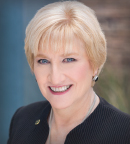The expected surge of patients, some with advanced cancers, wanting and needing oncology care as the COVID-19 pandemic ebbs, underscores the need for more oncologists, according to Barbara L. McAneny, MD, MACP, FASCO, cofounder and Chief Executive Officer, New Mexico Oncology Hematology Consultants/New Mexico Cancer Center in Albuquerque.
“We are facing a shortage of oncologists that would require a 10- to 12-year pipeline to fix if we started right now. For the foreseeable future, we need to redesign how we deliver cancer care so that we use the most precious resource of a cancer doctor very wisely. We need to work in physician-led teams, so that other people, nurse practitioners, and physician assistants can help assist with the care plan as we develop it,” Dr. McAneny told The ASCO Post.
“We need to stop wasting oncologists’ time doing prior authorizations on the phone with insurance companies, because a lot of patients don’t get seen when you are stuck on the phone,” Dr. McAneny continued. “We need to provide oncologists with rapid resources, like decision support pathways, so they can make decisions for patients that are accurate, up-to-date, and timely without having to search through the medical literature to find what that latest genetic mutation was and what drug was associated with it. No one is going to be able to remember all these new mutations that pop up, which we learn about every week. You need a systematized way to make sure that information is available to all physicians, so they can do the right thing for the patient in front of them.”
‘Tip of the Iceberg’
“We really have to look at restructuring our delivery of oncology care so that every oncologist can be as efficient as possible in seeing as many patients as possible, because this wave we are going to see of patients with later-stage cancers—this is just the tip of the iceberg,” Dr. McAneny pointed out. “As we keep patients alive for decades, which is wonderful, there is going to be an increasing shortfall of oncologists. If we don’t work smarter, we are going to have a lot of people with cancer who just can’t get in to see a cancer doctor. And that, in the richest country on the planet, is completely unacceptable.”
Efforts currently underway to train more oncologists are not sufficient, Dr. McAneny said. The shortage of oncologists is rooted in the shortage of physicians. “Internal medicine residencies aren’t filled, and internal medicine residents are the ones who take oncology fellowships,” Dr. McAneny pointed out.
“Part of the educational process that needs to be looked at is how to shorten that pathway.” A former American Medical Association (AMA) President, Dr. McAneny noted: “The AMA has a long-standing project to reimagine medical education for the 21st century. You don’t have to memorize everything like you did for the past century, but you need to know how to find it. We need to take a hard look at the medical education pipeline.”


